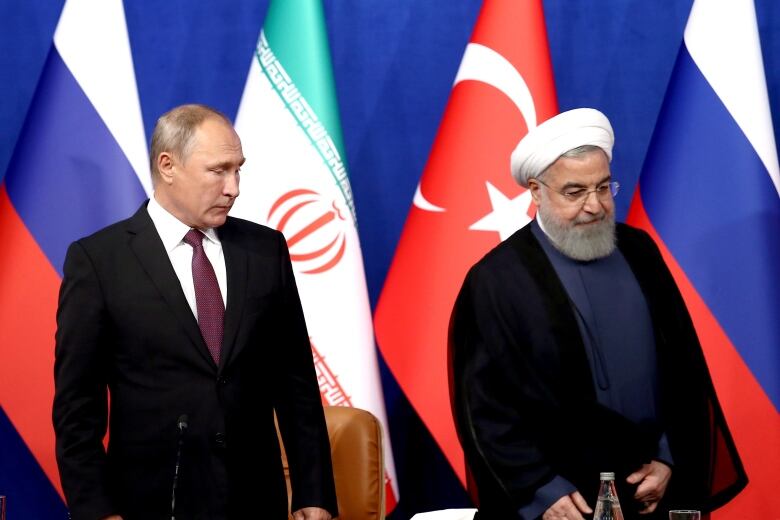Thousands of Syrians flee Idlib ahead of major assault
UN chief warns of 'humanitarian nightmare'

Syrians escaping violence in Idlib have arrived in villages near the Turkish border in droves, fearing Damascus will launch a full-blown assault on the rebel stronghold as UN Secretary GeneralAntonioGuterres warned of a"humanitarian nightmare unlike any seenin the blood-soaked Syrian conflict."
Guterresappealed toRussia, Iran and Turkey on Tuesday to "spare no effort to find solutionsthat protect civilians" in Idlib and said it was"absolutely essential" a full-scale battle was avoided.
An estimated three million people live in Idlib, the last major stronghold of active opposition to President Bashar al-Assad. The UN has described it as a "dumping ground" for people displaced from elsewhere in Syria during the seven-year war.
Assad has vowed to retake the region, backed by his Russianand Iranian allies. Syrian government and Russian warplanesbegan airstrikes in Idlib last week in a possible prelude to afull-scale offensive. They say they are targeting terroristgroups.
"I understand that the present situation in Idlib is notsustainable and the presence of terrorist groups cannot be tolerated. But fighting terrorism does not absolve warringparties of their core obligations under international law," said Guterres.
'God knows what's coming'
Senior officials from Russia, Iran and Turkey met with UNSyria envoy Staffan de Mistura in Geneva on Tuesday. Thepresidents of Turkey, Iran and Russia met in Tehran on Fridaybut failed to agree on a ceasefire in Idlib.
More than 30,000 people have fled their homes in northwest Syria since the army and allied forces resumed bombardment last week, the UNhumanitarian affairs office (OCHA) said on Monday. It said a military offensive could trigger the worst humanitarian catastrophe of the 21st century.
"What happened was destruction all over, burning, something you can't describe," said Ali al-Mheymid, 50, who escaped the village of Sarjah in Idlib province with his family last week.

"They did not differentiate between civilians and others," he told Reuters from a village near the Bab al-Hawa crossing with Turkey. He has moved into a tent there with 13 relatives in a makeshift settlement after paying the landowner rent.
Mheymid, who has five children, said people fled in the hundreds, some bringing only blankets and kitchen supplies. "People are hoping that right now, here is safer than there, but God knows what's coming."
If government forces advance further toward them, they would have no choice but to move to the Turkish frontier, he added. "There is no escape."
Ankara, which hosts some 3.5 million refugees, has said it could not take any more if an attack on Idlib drove a new surge of people toward its border. Turkish President Tayyip Erdogan wrote on Tuesday that an offensive would spark humanitarian and security risks for Turkey, Europe and beyond.
The Turkish military, which is deployed across an arc of northwest Syria near Idlib with its rebel allies, has also set up 12 observation posts around Idlib this year.
About half of those displaced so far have moved to camps, while others went to informal settlements, stayed with families or rented housing, OCHA spokesman David Swanson said on Monday.

'What will we do?'
Mamdouh Abu al-Saoud, who fled with his wife and three daughters, said he worried the fighting would only get worse.
"What will we do? Every time it follows us, we escape a meter to the north and leave it up to God, where will we go?" he said. His family, along with brothers and cousins, arrived in the informal camp near Bab al-Hawa three days ago.
Saoud said years of war had already forced them to flee many times before, first from their hometown in Hama province, then to live as refugees in neighbouring Jordan. They later went to southern Syria, only to move again in a withdrawal deal when government forces defeated rebels there around two months ago.
"We had come [to Idlib] without anything," he said.
An influx of displaced people has roughly doubled the Idlib region's population to around 2.9 million people in recent years. Civilians and fighters have poured in, shuttled out of towns and cities where Assad's military crushed rebels with the help of Russia and Iran.













_(720p).jpg)


 OFFICIAL HD MUSIC VIDEO.jpg)
.jpg)



























































































